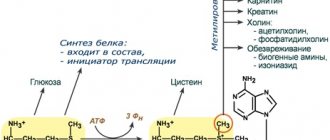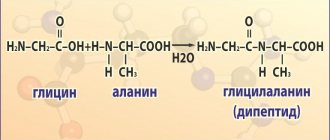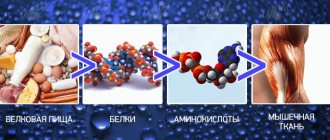Amino acids and weight loss
Amino acids give a person energy, but energy that does not go into fat reserves. As you know, while on a diet, a person, even one who is firmly committed to activity, often loses this attitude due to lack of energy and strength. The reason for this is the restriction of calorie intake, the stress experienced by the body due to a change in diet, a decrease in muscle mass, and, as a result, a decrease in performance and an increase in weakness. Taking amino acids prevents catabolism, stimulates fat burning, and suppresses appetite.
What are the best amino acids to take?
There is quite a large list of manufacturers producing excellent products. These are Universal, Optimum Nutrition, Twinlab and others. The supplements supplied to the market by these companies contain all the essential amino acids that stimulate metabolic processes, and therefore weight loss. In terms of effectiveness for weight loss, L-carnitine is most often recommended, so you should choose supplements that contain this substance. Here are the best products with amino acids: Gaspari Nutrition AMINOLAST, BCCA, L-Carnitine, Amino Fuel.
Taking amino acids
Typically, amino acids are drunk three times a day - in the morning, on an empty stomach, forcing the body to start working and building muscle fibers, before training in the middle of the day - to maintain amino acid levels at a high level, and in the evening to prevent the onset of catabolism. You can drink amino acids in capsules, tablets and powders; the form of administration does not affect the results. You can wash down the amino acid complex with either plain water or juices, and powdered amino acid supplements can even be added to protein shakes (for those who train hard with weights). Juices and cocktails increase blood sugar levels (within normal limits), which allows the body to absorb amino acids better and faster.
Can everyone take amino acids?
As a rule, amino acid preparations are well tolerated, since amino acids are not something alien to our body, however, sometimes there are allergic reactions to additional components of the preparations, to flavorings and dyes, for example (if you drink amino acids as part of ready-made cocktails). Therefore, allergic people can be recommended to drink amino acids without any additives. It is almost impossible to be poisoned by amino acids or cause an overdose (observing the intake standards); the supplements do not cause stomach irritation, since a single dose does not exceed 8 g of the drug (even a tenfold excess of a single dose will not cause anything other than a slight heaviness in the stomach, justified by a large number of protein molecules).
Types of Amino Acids Produced
Supplements from several companies can be found on the market. One of the most famous is BCAA. This famous drug from Belgium is available in capsules. It is packaged in packages from 100 to 3000 capsules, the cost of which starts from 500 rubles. The complex includes the following amino acids: valine, isoleucine, leucine, which are not produced in the body, but enter it only from the outside.
You can also find Gaspari Nutrition Aminolast on sale. It is manufactured in the USA and comes in capsules. The manufacturer claims that combining these supplements with diet and reasonable exercise promotes rapid weight loss. True, the capsules are quite expensive.
Amino Fuel is considered a fairly effective product, which is available in liquid form. If you remember to take this supplement regularly, you can provide the body with the necessary amino acids in the right quantity.
L-Carnitin products are among the most affordable. They are produced in the form of capsules, the cost of which is about 300 rubles. Taking them regularly allows you to start the processes of fat burning, stimulate muscle growth and improve overall well-being.
But this is far from a complete list of world-famous manufacturers.
Rating of the best amino acids
For athletes, these drugs are available in the form of capsules, tablets, powder or liquid form. The most important amino acids for muscle growth can be purchased at almost any pharmacy. In addition, these drugs are sold in sports nutrition stores. Amino acids for muscle growth:
- Glycine tablets.
- L-glutamine capsules.
- Arginine.
- Methionine.
- Cerebrolysin.
- Licin.
- Alvezin.
In most cases, the drugs are positively characterized by experienced athletes. Speaking about which amino acids are better, reviews from users indicate that pharmaceutical products are lower in cost compared to the supplements available in sports nutrition stores. And this is a definite advantage for professional athletes who use them regularly.
What are amino acids needed for and what role do they play?
Most people don’t even think about how important amino acids play in human life. Interest in what amino acids are needed for arises even when you want to achieve maximum efficiency and impact during hard work in the gym, so that your work does not go down the drain. Amino acids are the nutrients that make up all the protein tissues in the body. Since muscles consist almost entirely of protein, amino acids come first on the list of important components that determine the development and growth of muscles.
Modern food and its quality do not always allow you to get a sufficient amount of useful substances, which is why sports supplements are becoming more relevant. They allow you to fully replenish your amino acid profile, which will have a beneficial effect on accelerating muscle mass gain. Also, amino acids for weight loss play an equally important role, because during calorie restriction the body will consume energy from the muscles, actively processing muscle tissue. The only way to maintain volumes is to take additional amino acids as a supplement.
According to research, during intense training, up to 80% of all amino acids contained in muscles are used and consumed, so their replenishment is an essential condition for progression. If we talk about which amino acids are best for muscle growth, we can highlight the following names:
- Valin
- Leucine
- Isoleucine
- Glutamine
- Glycine
- Alanin
- Arginine
The first three amino acids are found in BCAA supplements, which play an incredibly important role for both men and women, regardless of their training program or goals.
Leucine, isoleucine and valine are not fully synthesized by the body, so it is vital to get these amino acids from the diet. If we talk about amino acids as a sports supplement, then it usually contains the full range of amino acids that the body needs
Video about amino acids for athletes
In addition to actively increasing muscle growth and strength, amino acids prevent catabolism. This process involves the breakdown of cells in order to extract energy from them, thus the action of catabolism is incompatible with building muscle mass, since it is the opposite of anabolism. Amino acids also take an active part in lipolysis, that is, the process of breaking down fats in the body. The faster it is, the better you will get rid of fat.
general description
Before looking at reviews of amino acids for muscle growth, you need to understand what they are. Why did they become essential in the training of athletes? Amino acids are the main components of a protein compound that are released during its breakdown when it enters the body. The chemical properties of these elements allow them to perform various useful functions, which include:
- Taking part in building muscles.
- Protecting muscle tissue from breakdown during recovery after sports.
- Normal functioning of the endocrine glands of the human body.
- Improvement of cartilage tissue and blood vessels.
Amino acid deficiencies
The second is the consequences of excessive use. If you eat amino acids in unlimited quantities, you can cause negative reactions in the body.
Among them:
- overload of the kidneys, through which amino acids are excreted;
- disturbance of nitrogen balance, leading to loss of muscle mass;
- activation of oxidative processes in cells;
- allergies (to soy, milk protein, etc.);
- the opposite reaction is weight gain instead of weight loss (if you take too many amino acids and do not expend the incoming energy during training).
And the third drawback is the need for the correct combination of amino acids with other additives. Incorrect combinations, in principle, will not cause harm to the body, but the digestibility of amino acids may deteriorate. You should not take amino acids with food or food substitutes, or at the same time with gainer and protein. It is better to differentiate them according to the manufacturer's recommendations.
What is the best form to take amino acids in?
Amino acid supplements are sold in the form of tablets, powders, capsules, solutions and injections. They are all equally effective. We recommend you everything except injectable forms - they most often provoke side effects.
Optimal dosages of amino acids
During high-intensity exercise, amino acids are taken in quantities of at least 5 g at a time. Professional bodybuilders claim that a single dose of 10-20 g of amino acids gives the most noticeable effect.
Daily frequency of amino acid intake
To build muscle mass - three times a day: in the morning, before and after training. In the intervals between taking amino acids, it is advisable to take protein.
For weight loss: in the morning, before and after training, in between main meals.
Taking amino acids at different times of the day has its benefits:
- morning intake (before breakfast) stimulates the production of growth hormone;
- By taking amino acids shortly before training, you will replenish your energy reserves and will work out with greater efficiency, in addition, you will shorten the muscle recovery period and eliminate the feeling of soreness;
- amino acids at the end of training lead to the active production of testosterone, which is responsible for muscle growth and strength indicators.
How to make sure that you have high-quality amino acids?
- If these are BCAA, then they should not dissolve completely in the liquid, and a film will appear on the surface of the water. The remaining amino acids in powder form are completely dissolved in water without sediment.
- The supplement has not expired.
- BCAA have a bitter taste.
- High-quality and completely sealed packaging.
- The amino acids in front of you fully correspond to the description (color, appearance, taste, smell or lack thereof, etc.) given on the label in the instructions.
Which is better: protein or amino acids?
Many novice athletes wonder what is better for muscle growth: amino acids or protein. These elements provide an opportunity for a person to develop muscle tissue and supplement his body with energy for training. It is impossible to specifically answer the question of which drug should be preferred. Each of them has its own merits. Both protein supplements and amino acids help build muscle tissue almost equally. The individual supplement plays its role and is effective in different ways in each individual case.
What do the coaches say? Is protein or amino acids better for muscle growth? What medications should you still take? In this case, trainers recommend that athletes use both elements in combination, but for this it is necessary to rationally plan the intake. Thanks to this, it will be possible to significantly improve the athlete’s well-being and his expected result.
Rules for taking amino acids
Taking amino acids for rapid weight loss
If your main goal is weight loss, then you need to consume amino acids constantly throughout the day, as well as before and after training. Portions should be small. Thus, the body will constantly work on their absorption, gradually burning fat deposits.
To do this, you need to consider a low-calorie, but not too strict diet. Remember that when you are physically active, your body burns more calories. Accordingly, the dishes in your daily diet should be more nutritious.
Taking amino acids to form a beautiful figure
When you achieve the desired results in losing weight, you can move on to the second stage on the path to a chiseled figure. It consists of increasing muscle mass, which is necessary to form a beautiful body contour. In this case, amino acids need to be taken in smaller volumes. A small amount should be consumed in the morning, as well as before and after training.
For both weight loss and muscle gain, you can get amino acids from food or use special nutritional supplements in the form of powders, capsules, and drinks. In both cases there are pros and cons. Let's look at both options from different angles.
Amino acids in food
The most natural way to get amino acids is through food. In this case, they enter the body in moderate quantities, are easily absorbed and have no side effects. During intense training, you need to build your diet based on foods rich in amino acids. These include:
- natural cow's milk;
- beef liver and meat;
- cod;
- egg;
- fermented milk products and cottage cheese;
- cereals – rice, millet, buckwheat, wheat, semolina;
- peas;
- pasta;
- wheat bread.
This kind of diet, combined with active training, will allow you to quickly lose weight and gain a beautiful, toned figure. However, in this case, you must be prepared for the fact that the result will come gradually and slowly.
Amino Acid Supplements
Those who want to experience the positive effects of training in the shortest possible time require the use of special amino acid supplements. But even in this case, you should remember that you will still have to work a lot. Moreover, sports nutrition should be developed by professionals. This is the only way you can achieve the desired results quickly and without harm to your health.
Keep in mind that dietary supplements have a number of contraindications. People with diseases of the gastrointestinal tract, liver, kidneys, gall bladder and bladder need to be especially careful. If amino acids are not taken correctly, problems can occur even in a healthy person, so be careful.
Every woman strives to look attractive. To create a beautiful figure, you need to approach the issue comprehensively. Focus your energy on physical activity and remember to eat right. This will allow you to gradually achieve the desired results. If you want to play sports professionally and impress others with a renewed body, then consider taking amino acids in the form of supplements. But remember that each option has its own advantages and disadvantages.
What are amino acids?
Amino acids enter our body with protein foods: meat, cottage cheese, beans, eggs and other products. Any modern person is well aware of which products contain such an important component.
Next, a chain of transformations occurs. Popov in the gastrointestinal tract, protein is converted into amino acids, which are used for the construction of other protein complexes characteristic of the human body. Then they penetrate into the blood and are used to build cells and tissues, including muscle fibers.
In addition to building protein molecules, amino acids are involved in a number of metabolic processes:
- normalize the functioning of the immune system;
- maintain the physical and mental state of the body;
- are a source of energy;
- quickly restore muscle tissue;
- participate in burning fat deposits.
Important: Just 22 amino acids make up a huge variety of proteins. Some the body can “build” itself, others are essential, which come only from food.
Amino acids in sports are natural supplements that do not harm the body and can be used almost unlimitedly during active training. It is easier to obtain them in ready-made form than by absorbing huge amounts of protein foods. This is especially true for the 3 essential amino acids – valine, leucine and isoleucine (BCAA). Experts advise taking this complex after training: at this time it is absorbed best.
The types of amino acids produced include:
- hydrolysates are proteins that have been broken down into amino acids. They are absorbed almost instantly and are quickly used to increase muscle mass. They are of natural origin;
- free amino acids are delivered to the muscles in finished form. These can be either individual substances (glycine, arginine, glutamine and others) or their complexes. They are an artificial product.
Both varieties are effective and give approximately the same effect and impact during muscle loads.
Benefits of pharmaceutical drugs
Due to the different forms of release, these drugs differ in the method of administration. Dosages agreed with your doctor are important. Injectable medications have no competitors in terms of speed of action. But invasive administration is always accompanied by the risk of infection and the occurrence of unwanted complications
The timing of receiving funds is also important
For maximum muscle growth effect, they should be taken in the morning, before and after strength training. If we are talking about losing weight, then 6 times a day in equal portions. The athlete’s weight and training loads are taken into account. The dosage of amino acids varies from 5 to 20 g.
Another nuance lies in sports nutrition. It is not always wise to combine it with drugs. In this case, amino acids are poorly absorbed and the benefits of taking them are neutralized. The same applies to their combination with gainers, proteins and a simple meal. They are not competitive in this situation. There are no cycles when using amino acids; you can drink them for an unlimited time, without breaks.
Manufacturers
The price depends on them. What are the main suppliers now:
- Ultimate Nutrition - USA. They produce mainly complexes with hydrolysates, vitamins and microelements. The cost starts from about 600 rubles.
- Dymatize Nutrition - USA. Good reviews about their caplets - they are easy to digest. Price from 600 and above.
- Optimum Nutrition - USA. One of the best lines, but their amino acid complexes are based on soy protein. Costs from 500 - 600 rubles.
- Multipower - Germany. From 1500 rubles packaging.
- MdoubleYou - Netherlands. From 900 rubles.
How to use?
The most common regimen is 1-2 doses (indicated in the manufacturer’s instructions) half an hour to an hour before training and immediately after. You can take 1 dose of a complex containing arginine at night - it stimulates the production of growth hormone. And definitely not on an empty stomach, otherwise you can get gastritis.
Do not take more than 5 doses per day. The dosage has been chosen to be optimal; your body will not absorb more - minor excesses are still excreted.
Always follow the manufacturer's instructions. Not all amino acids are compatible with food, protein and other sports nutrition.
How to take amino acids for bodybuilding
Now let's look in more detail at how to drink amino acids. Many professionals recommend drinking amino acids either 20 minutes before meals or during meals. In addition, most sports nutrition manufacturers advise consuming amino acids 20 minutes after finishing exercise in the gym and before falling asleep.
As for the second rule, in the points listed above, the athlete’s body needs amino acids and he looks for them inside his own body.
At the moment amino acids enter the body, the athlete’s body begins to incorporate the incoming amino acids into the muscle fiber.
Manufacturers of essential amino acids advise consuming them immediately after exercise. At this moment, the rate of their absorption in the body is greatest.
Reviews about the use of amino acids are mostly good. Of course, you shouldn’t expect a miracle, but there is a significant effect with proper use of amino acids. The effect will be in the form of a gain of muscle mass and a certain increase in strength results.
Side effects from consuming amino acids are extremely rare. But if a person has diseases and improper functioning of the kidneys or liver, then such people should definitely consult a doctor.
The kidneys help eliminate the remains of unnecessary amino acids/proteins from a person in the form of creatine and urea. If kidney function is impaired by disease, then there is a risk of side effects from consuming an increased dose of amino acids
In such cases, you should take amino acids with caution, paying attention to how your body reacts. If any complications arise, you need to stop using amino acids and seek help from a specialist.
Amino acids in bodybuilding
The process of breaking proteins down into amino acids is not simple. It takes a huge amount of energy and time. For an ordinary person this is the norm. But for a bodybuilder, such use of an amino acid is not an affordable luxury. We are talking about the metabolic window that occurs immediately after working out in the gym.
Every athlete knows that immediately after training it is necessary to consume carbohydrates and proteins. (bodybuilding, fitness coolmassa.com). Taking carbohydrates will restore expended strength, and protein will instantly help restore muscle fiber, and, consequently, gain weight. At these moments, muscle fibers begin to grow in huge leaps. And here the athlete just needs an amino acid complex.
If you take a regular protein shake after finishing your workout in the gym, it will not have the desired effect. When all the protein breaks down into amino acids, they will also go into the muscle fiber. But the effectiveness of such a cocktail will be low. Digestion and absorption will last at least 2 hours. If you take a shake before going to the gym, it will be awkward to work out on a full stomach.
An amino acid complex was created to solve such problems. It practically does not need to be digested, it is easily digestible.
An amino acid complex containing essential amino acids was created for use by athletes in parallel with regular amino acids. Indispensable when an athlete conducts anaerobic exercise with medium to high performance. Only anaerobic exercise, with heavy weight. Athletes conduct such exercises when they focus on growth and muscle gain.
Which is better: protein or amino acids?
If you are planning aerobic training (swimming, running, etc.), then taking essential amino acids does not make much sense. Their performance in aerobics is low.
In any case, there is a result, but it is small. But this does not mean at all that those athletes who are not involved in bodybuilding do not need amino acids. Complete amino acid complexes are needed, but more relevant for them. Although in many countries they have already made it a rule to give schoolchildren 2 tablets of such amino acids after physical education lessons.
It must be remembered that amino acids are the structural chemical units that form proteins. Amino acids are 16% nitrogen, which is the main difference from the other two essential food components - carbohydrates and fats.
The importance of using amino acids for humans is determined by the enormous role that proteins play in all life functions. Every living organism, from the largest animals to the smallest microorganism, is made up of proteins.
Various forms of proteins are involved in most processes occurring in all living organisms.
BCAA amino acids
BCAA amino acids are a whole complex of elements, which includes three essential types: isoleucine, leucine and valine. These products are aimed at maximizing the growth of muscle tissue, as well as protecting them from the catabolic process during recovery or during drying.
Now let's take a closer look at the best amino acids for muscle growth.
How to choose
If you nevertheless decide to purchase drugs containing synthesized essential amines, you should clearly formulate the goals that you plan to achieve. For example, to burn fat, you sometimes need to take such supplements more often than to gain weight.
Most drugs are recommended to be taken before and after training, but not during. And to gain muscle mass, it is useful to consume such complexes in the morning, when they are best absorbed by the body.
Certain amines affect the human body differently. Let's take a closer look at the benefits of using these compounds:
To stimulate the functioning of the brain and central nervous system, it is very useful to take glutamine (glutamic acid) - it helps fight nervous disorders (stress, schizophrenia) and phenylalanine (improves memory).
For athletes who want to gain weight, BCAAs are indispensable (protecting and nourishing muscles, activating anabolic processes). And for those who, on the contrary, are cutting, it will be useful to add cysteine, glycine and one of the best fat burners - L-carnitine - to the diet.
For accelerated muscle recovery after training, citrulline and the antioxidant beta-alanine are excellent. Glutamine also restores and nourishes muscle tissue. Methionine (fights liver dysfunction), cystine and arginine (improves muscle nutrition, transport of nutrients) are useful for internal organs.
To increase the amount of collagen and elastin, and therefore beautiful skin, you need: BCAA, lysine, cysteine. Sports nutrition containing these acids exists in the form of tablets, capsules, powders and injections. By the way, hardly anyone would advise giving preference to the latter, because complications may arise.
There are several criteria by which quality is determined:
- powder products (except BCAA) dissolve in water;
- bitter taste;
- color and consistency match the description on the package.
Why do athletes need amino acids?
When playing sports, the body spends much more resources and also requires more nutrients for recovery, so the need for amino acids only increases. They contribute to:
- Gaining muscle mass;
- Fat burning;
- Slowing down catabolism;
- Increased strength indicators;
- Accelerate recovery.
Moreover, amino acids are needed simply so that the muscles can function properly, even while walking.
How amino acids affect the body
Amino acids that enter the body with plant and animal proteins often have a complex structure, which makes their absorption longer and more difficult. The amino acids that make up sports nutrition supplements do not have such a deficiency - their absorption occurs as quickly as possible due to the most complete correspondence of these amino acids to those that our body operates with.
Amino acids in sports nutrition can quickly replenish the deficiency of these substances in the body, as well as ensure rapid and high-quality growth of muscle tissue and its protection from catabolic processes. Their effectiveness during sports has been confirmed by many scientific studies.
Amino acid complexes of sports nutrition will not harm your body, since they do not contain any other substances other than those that the body needs for its functioning.
The only time amino acids can harm you is if you exceed your dosage.
Modern sports nutrition manufacturers produce amino acids in the form of dietary supplements, which can be in the form of tablets, capsules or even liquid concentrate. Some forms of amino acids can be purchased at the pharmacy.
There is practically no difference in which form is better - the time frame for their absorption varies within 10-15 minutes, and the prices for amino acids in different forms are almost the same.
Amino acid names
According to the athletes, a list of the best amino acid producers was compiled. They can be purchased at a sports nutrition store; as a rule, they are not sold in pharmacies. Names of amino acids for muscle growth:
- Amino Liquid 50 Scitec Nutrition;
- SciVation Xtend;
- Amino FUEL LIQUID Twin Lab;
- Amino Gold Ultimate Nutrition;
- Optimum Nutrition Amino Energy;
- Weider PURE Amino EGG;
- AminoMax 8000 Gaspari Nutrition;
- Amino Power System;
- Anabolic Amino Olimp;
- Dymatize Super Amino 6000.
What are amino acids used for in sports nutrition?
No matter how regular and grueling your workouts are, without the additional use of stimulating foods they will not quickly bring the desired effect. Amino acids in sports nutrition are important building blocks for building muscles and creating a sculpted figure.
Why are amino acids needed in sports nutrition?
First, let's look at what these supplements are. They are divided into two types:
- replaceable (synthesized by the body independently);
- irreplaceable (enter the body with food, nutritional supplements).
The complex of amino acids in sports nutrition usually consists of essential components (leucine, phenylalanine, valine, lysine, isoleucine, threonine, etc.), which are necessary for the development of muscle tissue and strengthening the body as a whole. Their effect depends on how and in what quantities you take them.
To increase the effectiveness of strength training, it is advisable to take a dose of the drug 20 minutes before exercise and 20 minutes after it. Supplements are quickly absorbed, therefore they contribute to the rapid replenishment of expended energy.
Why else are amino acids needed in sports nutrition?
- suppress appetite;
- reduce post-workout pain;
- speed up the process of building muscle mass;
- reduce cholesterol levels;
- promote fat burning;
- relieve nervous tension.
Among the advantages of amino acid complexes, it is also worth highlighting the convenient form of administration (in the form of tablets, capsules) and low calorie content.
As for the possible harm of amino acids in sports nutrition, no side effects have been identified if the rules for taking them are followed.
The only thing is that such supplements should be taken with caution if you have problems with the cardiovascular system or kidneys
In addition, you should take breaks between courses of taking medications to avoid addiction and give the body a “rest.”
Amino acids for weight loss in sports nutrition
As already mentioned, amino acid complexes promote the breakdown of fat deposits. They also reduce appetite, and when the desired weight is reached, they allow you to form a beautiful, sculpted figure.
The following amino acids are most often recommended for women in sports nutrition for weight loss:
- lysine (increases metabolism, prevents the deposition of fat reserves);
- arginine (accelerates the fat burning process);
- leucine (creates the “illusion” of prolonged saturation and helps preserve muscle mass);
- phenylalanine (increases performance and speed of metabolic processes in the body);
- kartinin (removes toxins, blocks the growth of fatty deposits);
- tyrosine (suppresses hunger, activates metabolic processes).
Amino acids play a special role in sports nutrition for women. They make it easier to tolerate low-calorie diets, so “favorite” by many, and allow you to quickly lose weight and gain a beautiful figure. The following amino acid supplements are suitable for further building muscle mass: taurine, glutamine, histidine, BCAA complex.
But not only the fair sex can lose weight using special supplements. The above amino acids have a similar effect on the male body.
Side effects
Are there any side effects of amino acids for muscle growth? Reviews and research from experts indicate that in most cases these elements are beneficial for the human body. However, amino acids are safe for health if consumed in moderate doses. Only sometimes the drug can cause harm. As a rule, the following side effects should be included:
- food poisoning;
- problems with the cardiovascular system;
- suppression of the function of the central nervous system.
- liver and kidney diseases.
However, if you choose the right dose, take amino acids systematically and clearly, and also consult with a specialist before using the drug, then such problems should not arise. Please also note that if you stop taking supplements after intensive use, or completely forget about a balanced diet, muscle tissue will begin to quickly decrease in volume. These elements themselves do not have side effects if the athlete does not have problems with the kidneys, digestive tract, liver, heart or blood vessels.
Indications for the use of amino acids, contraindications, side effects
Indications for use of amino acids
Carefully! If you are being treated with medications, infovitamin.ru reminds you: take any supplements only with your doctor's permission.
Release form
| Your choice |
| The name of an amino acid is often preceded by the letter L or D. These are two forms of these substances. Our body contains the L-form - choose it. The only exception is the DL-phenylalanine mixture prescribed for chronic pain. |
Method of application of amino acids
They depend on the specific substance and the person’s condition and usually range from tens to hundreds of milligrams. Infovitamin.ru advises: unless there are special indications, taking a single amino acid is not recommended - this is fraught with nutritional imbalance. If it is still prescribed, the course can only be continued for more than three months under the supervision of a specialist.
Amino acid supplements designed to compensate for nutritional deficiencies are most effective when taken with meals. For other purposes, the time of administration does not matter, although for asthenia it is better to take supplements in the morning on an empty stomach.
Contraindications to the use of amino acids
| Last news |
| Beta-alanine is the active ingredient in some medications prescribed for menopause. This amino acid reduces peripheral vasodilation, relieving hot flashes in a non-hormonal manner. Arginine supplements weaken the ability of platelets to clump and attach to the walls of blood vessels, triggering blood clotting. This is useful in preventing thrombosis, which can lead to myocardial infarction and ischemic stroke. Athletes are sometimes recommended to supplement the amino acid (particularly methionine) derivative of creatine to improve skeletal muscle function. This substance is involved in their energy metabolism. Doses over 6 g/day. give a pharmacological effect. |











